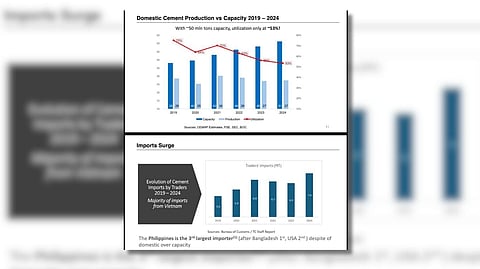
- NEWS
- the EDIT
- COMMENTARY
- BUSINESS
- LIFE
- SHOW
- ACTION
- GLOBAL GOALS
- SNAPS
- DYARYO TIRADA
- MORE

Local cement manufacturers are urging the Tariff Commission (TC) to issue a verdict in their favor, and for the Department of Trade and Industry (DTI) to immediately impose definitive safeguard measures as the dumping of Vietnamese cement in the country continues to erode their revenues.
The TC conducted a final public hearing on the matter on 16 June, but it has yet to release a final judgment on whether there are merits to impose definitive safeguard duty on imports of ordinary portland cement and blended cement from various countries.
According to the Cement Manufacturers Association of the Philippines (CeMAP), in 2024 alone, cement imports reached 7.6 million metric tons, mostly from Vietnam, even though the Philippine industry has a total capacity of 51 million tons.
“Demand was only around 35 million tons, and actual production dropped to 27 million tons. That means only 53 percent of the capacity was used. The result: P5 billion in losses, slower operations, and job cuts,” CeMAP executive director Rey Baja said in a statement on Wednesday.
Unfair situation
Baja stressed that the situation is unfair, noting that some Vietnamese cement companies are state-owned or receive government incentives that Filipino manufacturers do not get.
With the incentives, Vietnamese cement companies are allowed to sell cement at very low prices, even when the Philippines already has enough supply.
With this, Baja emphasized the urgency of the safeguard measure.
“We need this safeguard to ensure the industry remains viable and to protect local jobs. We also don’t think it will result in higher prices. It is of national interest to promote and protect the local cement industry against unfair competition from other countries. The Philippines is not subsidized,” he lamented.
The safeguard measure has strong support from business groups like the Philippine Chamber of Commerce and Industry and the Federation of Philippine Industries.
They say it is needed to protect local jobs and keep the industry alive, as cement manufacturing contributes at least a percent to the country’s GDP and supports around 130,000 direct and indirect jobs.
Imposition of definitive safeguard duty needed
“We are waiting for the decision of TC. Our prayer is for the imposition of a definitive safeguard duty,” according to Baja.
Safeguard duty to protect jobs
Furthermore, Baja maintained that the proposed safeguard duty on cement imports is not expected to cause price increases, saying that the measure is needed to give local manufacturers a fair chance to compete against foreign suppliers that enjoy their government’s backing.
In March, the DTI imposed a provisional safeguard duty of P400 per metric ton, or P16 per 40-kilogram bag, on imported cement.
The duty will last for 200 days and was initiated motu proprio by the DTI after finding signs of serious harm to the local industry.
